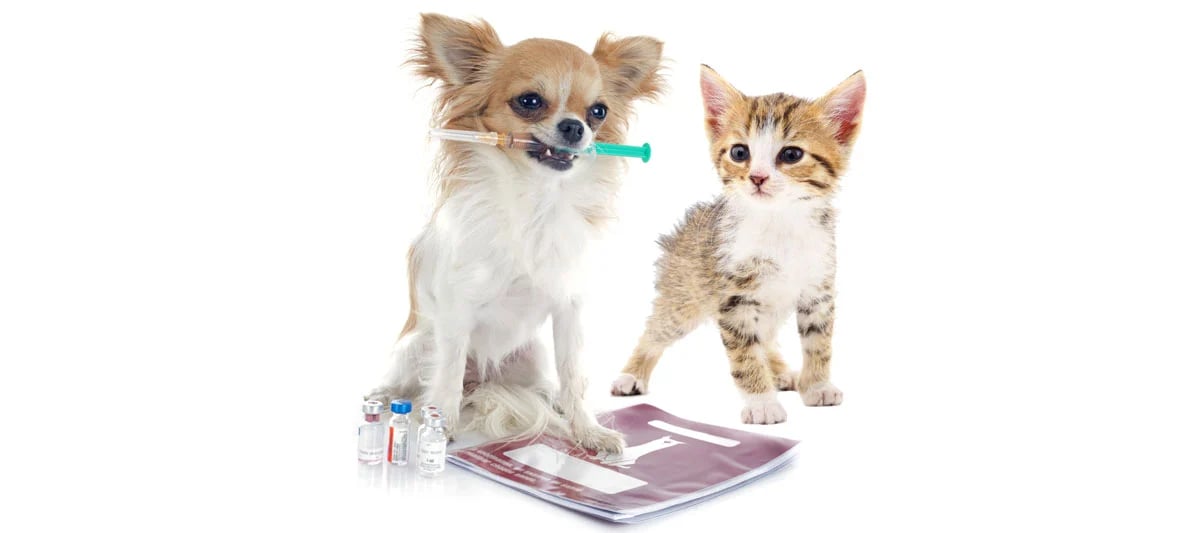"Each Pet's vaccinations are based on their unique needs."
Vaccinations play an important part in keeping your pets healthy. Animals can be exposed to a variety of dangerous illnesses in their lives, but a standard course of vaccinations can prevent them.
At Intermountain Pet Hospital, we ensure that your pets stay healthy and happy by staying on top of the most current vaccination protocols.
 Our vaccines come with the following two-part guarantee:
Our vaccines come with the following two-part guarantee:
- Intermountain Pet Hospital only purchases guaranteed vaccines from reputable manufacturers with stringent quality control measures.
- If your pet contracts a disease for which we administered vaccination according to its proper schedule, we will pay for all diagnostic testing and treatment for that disease.
Common Dog and Cat Vaccinations
Typical vaccinations and testing for dogs include:
- DA2PP/4L (Distemper, Adenovirus, Parainfluneza, Parvovirus, Leptospirosis 4 serovars): Puppies receive this vaccination when we give them their first exam at 8 weeks of age. We then give them the vaccine every three weeks for a total of 3 inoculations. Once your dog completes this first schedule, they'll need the vaccine again every 1-3 years, depending on their age and risk status. We customize the vaccine schedule based on risk and will help you determine how often your pet will need the vaccine.
- Bordetella: This vaccination protects your dog from Bordetella, one of the most respiratory diseases for canines. Puppies receive this vaccine at 12 weeks of age. After this first vaccination, dogs will a booster every 12 months. There are many other respiratory infectious agents that cause “Canine Infectious Respiratory Disease,” which this vaccine does not protect against. Most of the other respiratory infectious agents are not as aggressive and are self-limiting.
- Rabies: Dogs get the first shot for rabies at 16 weeks of age then again at 1 year of age. After that, they'll need a booster every 3 years. This vaccine is federally regulated and required by law for public safety.
- Canine Influenza (H3N2) and (H3N8): This emerging disease has been diagnosed right here in Idaho and the surrounding states. It is highly contagious causing fever, coughing, lethargy, runny nose, etc, and in some cases fatalities. It is prevented by inoculating with 2 initial boosters given 4 weeks apart, then annually. As Canine Influenza is so contagious and close to home, and because the vaccine is safe and affordable, vaccinations for Canine Influenza are required for all patients boarding, grooming, or staying for Day Camp at the lodge.
- Crotalus Atros (Rattle Snake vaccine): This vaccine is for high-risk breeds or lifestyles (hunters, hikers, etc). Two boosters 2 - 4 weeks apart are needed for initial immunity. It is then boosted annually. Puppies may receive this vaccine at 12 and 16 weeks of age. However, it is recommended to split and give a week later than other vaccines to prevent too many injections all at once.
Typical vaccinations for cats include:
- FVRCP (Feline Herpes, Calicivirus, and Panleukopenia) and Feline Distemper: Kittens receive this vaccination every 3 weeks starting at 8 weeks of age for a total of 3 inoculations. After your kitten completes this first schedule, they'll need the vaccine again every 1-3 years, depending on their age and risk status. We customize the vaccine schedule based on risk and will help you determine how often your pet will need the vaccine.
- Rabies: Cats get their first shot for rabies at 12 weeks of age. They then get another shot 1 year later followed by inoculations every 3 years. This vaccine is federally regulated and required by law for public safety.
- FeLV (Feline Leukemia): Cats receive this vaccine at 12 weeks of age, then again at 16 weeks of age. After that, they'll receive a booster at their annual wellness exams. For indoor-only cats, the schedule may change or be discontinued, depending on risk status. We can make a recommendation in these cases.

 Our vaccines come with the following two-part guarantee:
Our vaccines come with the following two-part guarantee: